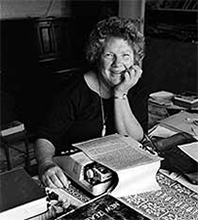And now for the fourth installment in Malvern Books’ arbitrary and occasional Poetry Month A-Z series…
F is for Frame, Janet
 Janet Frame (1924-2004) is New Zealand’s most acclaimed author. She wrote eleven novels and four short story collections (I recommend her novels Owls Do Cry and Living in the Maniototo, and also Prizes: The Selected Stories of Janet Frame), and was a nominee for the Nobel Prize in Literature. And she’s also pretty well known for being the big ol’ ginger weirdo in Jane Campion’s film, An Angel at My Table, an adaptation of Frame’s autobiographical trilogy of the same name. (Frame’s personal history makes for harrowing reading/viewing: she was wrongly diagnosed with schizophrenia, received over two-hundred electroshock treatments, and was days away from a scheduled lobotomy when news came through that her first published short story collection had won a major literary prize.)
Janet Frame (1924-2004) is New Zealand’s most acclaimed author. She wrote eleven novels and four short story collections (I recommend her novels Owls Do Cry and Living in the Maniototo, and also Prizes: The Selected Stories of Janet Frame), and was a nominee for the Nobel Prize in Literature. And she’s also pretty well known for being the big ol’ ginger weirdo in Jane Campion’s film, An Angel at My Table, an adaptation of Frame’s autobiographical trilogy of the same name. (Frame’s personal history makes for harrowing reading/viewing: she was wrongly diagnosed with schizophrenia, received over two-hundred electroshock treatments, and was days away from a scheduled lobotomy when news came through that her first published short story collection had won a major literary prize.)
But Frame-the-poet gets less attention, though poetry was very dear to her. She referred to it as “the highest form of literature,” and in a 1979 interview she said, “Poetry is my first love.” However, Frame’s belief that a poem must be perfect—“you can have no dead wood in a poem”—made it difficult for her to ever declare a verse finished, and she published just one poetry collection in her lifetime (The Pocket Mirror, 1967). After her death, her niece, Pamela Gordon, and two fellow poets, Denis Harold and Bill Manhire, released The Goose Bath, a selection of over a hundred of Frame’s unpublished poems (the title comes from the old garden fountain in which she kept her not-quite-finished work). Frame might not have considered her poetry entirely “real” or “successful,” but the work in The Goose Bath is beautiful nonetheless, full of rich imagery, a sense of mischief, a novelist’s inventiveness (we are addressed by a brain tumor, the Guggenheim, a piano), and a profound love of the natural world (birds and cats abound).
I Take Into My Arms More Than I Can Bear To Hold
I take into my arms more than I can bear to hold
I am toppled by the world
a creation of ladders, pianos, stairs cut into the rock
a devouring world of teeth where even the common snail
eats the heart out of a forest
as you and I do, who are human, at nightyet still I take into my arms more than I can bear to hold
* * *
from “Tenant”
No, he didn’t bath. He never turned the radio up loud.
He came from somewhere the back of beyond
where they sit under lemon trees, and ask
riddles of giant vermilion cattle with white faces.One thing in his life—there was a tortoise.
Like a crude brooch worn across his heart, it sat
brown and flat and quiet—except
it sparkled when he spoke to it.
